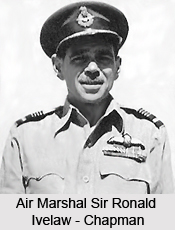 Air Marshal Sir Ronald Ivelaw-Chapman was born in Guiana in 1899. Then Guiana was under British rule. His father was a successful businessman. At the age of four he was taken to England. He received his formal education from Junior School and Senior School at Cheltenam. In 1917 Sir Ronald Ivelaw-Chapman was selected in the Royal Flying Corps and took training from No.12 and No.53 Flying Training School. In 1918 Sir Ronald Ivelaw-Chapman was appointed to No.10 Squadron RFC in France as 2nd Lieutenant. Here he took part in some bombing operations and was awarded the Distinguished Flying Cross. After that he rose to the rank of acting Captain and commanded the Squadron `B` Flight.
Air Marshal Sir Ronald Ivelaw-Chapman was born in Guiana in 1899. Then Guiana was under British rule. His father was a successful businessman. At the age of four he was taken to England. He received his formal education from Junior School and Senior School at Cheltenam. In 1917 Sir Ronald Ivelaw-Chapman was selected in the Royal Flying Corps and took training from No.12 and No.53 Flying Training School. In 1918 Sir Ronald Ivelaw-Chapman was appointed to No.10 Squadron RFC in France as 2nd Lieutenant. Here he took part in some bombing operations and was awarded the Distinguished Flying Cross. After that he rose to the rank of acting Captain and commanded the Squadron `B` Flight.
After First World War Sir Ronald Ivelaw-Chapman was sent to India and was given the charge of No.97 Squadron. In 1923 he was transferred to U.K as a test pilot of the Aircraft & Armament Experimental Establishment at Martlesham, Heathand. Afterwards he served as an ordinary pilot, with two multi-engined night bomber squadrons. He was appointed to the No.70 Squadron and participated to the Kabul air evacuations in Iraq. For his extraordinary performances in these operations he received the Air Force Cross. After that he commanded several flying units. Sir Ronald Ivelaw-Chapman graduated from RAF Staff College and served as a staff of Air Ministry. In 1936 he commanded the No.6 FTS at Netheravon. Just before World War II he was given the responsibility of rewriting the RAF War Manual at Air Ministry office. On promotion to the rank of Group Captain Sir Ronald Ivelaw-Chapman commanded the No.4 Bomber Group during the early of part World War II. After few months he was transferred to U.K .At that time he served as the staff of intelligence planning. In 1943 he was promoted to the rank of Air Commodore and was appointed No.1 Group as a Base Commander at Elsham Wolds.
In 1944 he flew in a Lancaster bomber, which attacked and destroyed German ammunition at Aubigne Racan. After that the Germans from a farm where he was hiding arrested him. Air Marshal Sir Ronald Ivelaw-Chapman was brutally interrogated but he remained tightlipped. The Germans then sent him to a normal prisoner-of-war camp. He was freed after the war and subsequently was promoted to the rank of Air Vice Marshal. He served as the commander of No.38 Group at Marks Hall for nearly two years. Air Marshal Sir Ronald Ivelaw-Chapman returned to London and was appointed as the Director Imperial Defense College, Belgrave Square. In 1950 he was sent to India as the Commander-in-Chief of the fledgling Indian Air Force. He served two years in this post. In 1951 Air Marshal Sir Ronald Ivelaw-Chapman was transferred to U.K as Commander-in-Chief of Home Command at White Waltham. After he was appointed as the Vice Chief of Air Staff at Air Ministry. He retired from his service in 1957. Air Marshal Sir Ronald Ivelaw-Chapman died in 1978.






